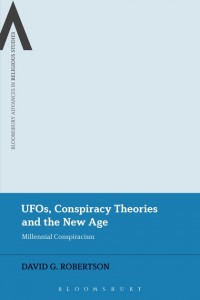Area 51, Ancient Aliens, endemic child abuse at the BBC, Reptilians, Watergate, 9/11, renegade preachers rising from the dead, the grassy knoll, The Da Vinci Code, Hydra, climate change, the moon landings, Satanic Ritual Abuse, The X Files… the popular imagination is rife with stories of secret plans and cover-ups, agencies working behind the scenes, grand plans carried without the knowledge of the unsuspecting masses, lies, deceit, and an elect few who know ‘the truth’. Sometimes, stories which at one time seemed far-fetched receive widespread acceptance and become the hegemonically accepted norm. At others, they remain the preserve of relatively small groups of “nutters”, and become designated as “conspiracy theories” by those who have the power to do so. What might this popular discursive trope be able to tell us about contemporary Western society? How might scholars go about studying it, particularly when they themselves are frequently implicated as working against the truth by “insiders”? And what might all of this have to do with the contemporary academic study of religion?
 To discuss this tantalizing subject, we are joined today by a scholar who will be no stranger to regular listeners of the Religious Studies Project, Dr David Robertson. The interview begins with David’s own journey to this research field, before considering some basic questions such as “what is a conspiracy theory?” David then lays out the historical context of the parallel development of contemporary millennial and conspiracist discourse, and his case studies – Whitley Streiber, David Icke, David Wilcock, and their audiences. Discussion then turns to the meat of Robertson’s theoretical conclusions concerning epistemic capital, popular epistemic strategies, the UFO as a discursive object connecting two fields of discourse, power, and prophecy. The interview concludes with discussion of the relevance of this field of study to Religious Studies more broadly, and some challenging admonitions to for the discipline.
To discuss this tantalizing subject, we are joined today by a scholar who will be no stranger to regular listeners of the Religious Studies Project, Dr David Robertson. The interview begins with David’s own journey to this research field, before considering some basic questions such as “what is a conspiracy theory?” David then lays out the historical context of the parallel development of contemporary millennial and conspiracist discourse, and his case studies – Whitley Streiber, David Icke, David Wilcock, and their audiences. Discussion then turns to the meat of Robertson’s theoretical conclusions concerning epistemic capital, popular epistemic strategies, the UFO as a discursive object connecting two fields of discourse, power, and prophecy. The interview concludes with discussion of the relevance of this field of study to Religious Studies more broadly, and some challenging admonitions to for the discipline.
Support the RSP by using our affiliate link to buy David Robertson’s new book!







